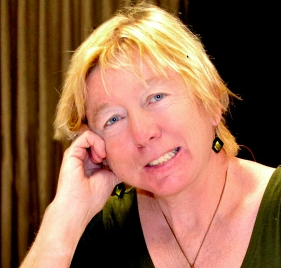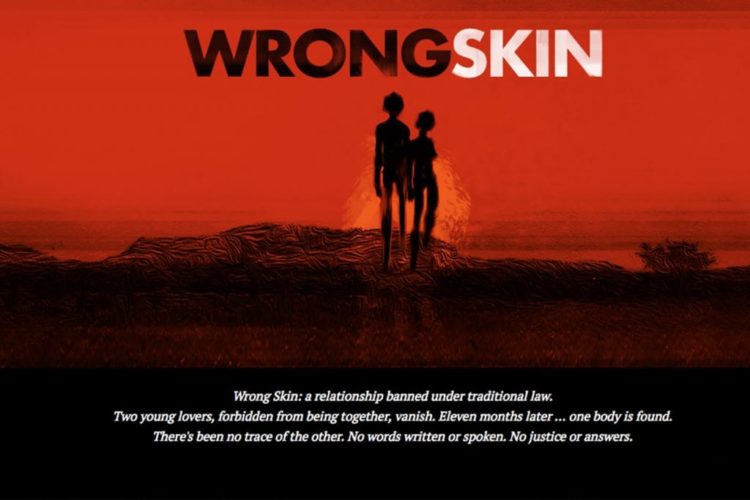
"Wrong Skin" is a groundbreaking podcast from Australia, investigating the death of a young Aboriginal woman and the disappearance of her lover
Since then, celebrated authors such as the Australian Anna Funder have harnessed subjectivity to propel their writing to greater depths. Funder’s award-winning 2004 study of East Germany in the Cold War period, Stasiland, begins in the first person:
I am hungover and steer myself like a car through the crowds at Alexanderplatz station. Several times I miscalculate my width, scraping into a bin, and an advertising bollard. Tomorrow bruises will develop on my skin like a picture from a negative.
It might seem an unlikely opening for a book that will expose the cruel efficiencies of a surveillance state and the human tragedies at its center – but it places Anna, as narrator, clearly in the reader’s field of view and invites us to accompany her on a journey of discovery. It also makes Anna vulnerable: that admission, “I am hungover,” immediately makes her flawed and human. Just like us. From this perspective, she frames her interviewees: She makes us sit up and admire the immense bravery of 16-year-old Miriam, who almost succeeds in scaling the Berlin Wall; she does not disguise her loathing of Karl-Eduard von Schnitzler, a popular broadcaster and outspoken Stasi supporter of the day.
The great literary journalists of the last 50 years traditionally employed the tools of fiction to write true stories: the real people they depict are developed as characters and interviews are quoted as conversations; deep research and analysis is conveyed as plot and reconstructed scenes; and the writer employs fresh, descriptive language to place the reader at various locations. This genre, also described as creative non-fiction or narrative journalism, thrives today as long-form articles in outlets such as Empire, Vanity Fair, and the New Yorker. Exemplars include Katharine Boo, Ted Conover, Susan Orlean, William Finnegan and the late David Foster Wallace.
The (literal) power of voice
But when the audio medium is added to the arsenal of narrative journalism, its impact is hugely amplified. Firstly, the authorial voice is literally heard, direct and unmediated, via the podcast host. This foments a strong bond. If the host is adept at writing in the vernacular style that audio prefers, as Sarah Koenig did in Serial, the host can come to seem like a friend. Koenig was often described as being like a companion to listeners on the podcast’s quest to understand what happened in the 1999 murder of schoolgirl Hae Min Lee. She lost some of that closeness in Serial 2, because the core interviews with captured Marine Beau Bergdahl were not done by her. But she is back on form in Serial 3, with taut, muscular writing that puts her firmly on set. Here she is in the Cleveland courthouse elevator in Episode One:
While podcasting has a lot in common with Koenig’s previous habitat of radio, and in particular the contrived informality of her old haunt, This American Life, a major difference is its liberation from the tyranny of the broadcast clock. A podcast can be as long or as short as it needs to be: There is no imposed duration constraint, on an episode or on an entire series. Thus in Serial’s debut, Koenig and Julie Snyder, the executive producer, felt able to dwell on ambiguities and contradictions, and chronicle the back-and-forth of the investigation as it unfolded, rather than deliver it as a neatly packaged product with a clear narrative arc. This was one masterstroke that had the effect of involving listeners in a “live” story, spawning sub-Reddit groups and fan clubs that speculated on the latest revelations. The other was almost accidental, as Snyder told an audience at the Sydney Opera House in 2016: having Sarah be very much a character in the story:When I’m feeling optimistic I appreciate that an elevator car in a government building is one of the few places left in our country where different kinds of people are forced into proximity. I like to think that we can all stand so close to one another, with our sensible heels, and Timberland boots, and American flag lapel pins, and fake eyelashes, and Axe cologne, and orthopedic inserts, and teardrop tattoos, and to-go coffees. And when the elevator doors open up, spilling us out onto our floor, the fact that no one is bloodied or even in tears, it’s a small, pleasing reminder that we’re all in this together.
Documenting to an extent her own reporting and what she thought and what she didn’t think a lot of times… She’d never really gone quite that far before and I think at first she felt uncomfortable about it, but I really was pointing out to her that… this isn’t a trick, this isn’t some like pandering flashiness… This is what serves the story, you need to do it for this story because that story was a story that really lived in the details and the only way a listener understood the significance of the details was for Sarah to tell us what she made of them…
The effect was to draw the listener closer, make them feel like a fellow-investigator. Koenig was also lauded for her transparency. “There were times where she waffles and says ‘I don’t know what to make of this, I don’t know if this is significant,'” Snyder recalls. Far from undermining her standing as a journalist, Koenig’s admissions of ignorance and confusion increased her credibility.
Podcast hosts get hugs
Serial had stumbled on the power of the subjective voice that so animates works like Stasiland, but not just with the added impact of audio: It discovered the nature of podcasting as a new media genre. Anyone who has worked in radio knows about its ability to create intimacy and connection; Franklin D Roosevelt harnessed it back in the 1930s to deliver “fireside chats” to the nation over the wireless. Snyder calls radio an “empathy machine.”
When the host is speaking right into the listener’s ears, the intimacy ratchets up even more.
But podcasting turns those qualities up to 11, for two reasons: People usually listen privately, often through headphones; and it’s an opt-in medium. That sets up the perfect conditions for intimacy: Unlike the radio, where you’re fighting the listener’s random switch-on and ability to flick the dial, the podcast host can trust that the listener wants to hear them. This allows them to relax and be authentic, which increases their relatability. When the host is speaking right into the listener’s ears, the intimacy ratchets up even more.
Manoush Zomorodi, who now hosts ZigZag at the indie podcast network Radiotopia, summed up the difference between being a radio presenter and a podcast host in one word: Hugs. When her show, Note To Self, about human stories in the digital world, was broadcast on WYNC, a public radio station in New York, Zomorodi’s interaction with listeners was cordial but professional. But when the show took on a second life as a podcast, even though the content was exactly the same, the response was very different. Fans at public events would throw their arms around her. She told a podcasting conference in Sydney in 2016 that she put it down to podcasting’s easy, accessible delivery mode: “I walk home from the subway with them, I’m with them.” The lack of gatekeepers also allows the podcast host to be more uninhibited, which further bonds listeners. “We are buds,” Zomorodi said. “We are friends.”
Choreographing audio journalism: S-Town
The Peabody-winning podcast, S-Town, marries conventions of literary journalism with the best aspects of crafted audio storytelling to immense effect. At its centre is a study of the mordant, self-destructive genius John B. McLemore, a 40-something fixer of antiquarian clocks who is both shaped and shackled by his small Shit Town (S-Town), actually Woodstock, Alabama. Literary journalists can only write about delicious details they unearth. But S-Town gives us the real deal: We hear first-hand the magnificent rants about climate change, chicanery and ignorance that McLemore delivers with rococo Southern musicality and a stand-up’s timing.
Listen here to how producers Brian Reed and Julie Snyder craft one rant around an operatic aria, delivering a kind of acoustic alchemy that both counterpoints and elevates John B’s vitriol.
We ain’t nothin’ but a nation of goddamn, chicken-shit, horse-shit, tattle-tale, pissy-assed, whiney, fat, flabby, out-of-shape, Facebook-lookin’, damn twerk-fest, peekin’ out the windows and snoopin’ around, listenin’ on the cellphones and spyin’ in the peephole and peepin’ in the crack of the goddamn door, listenin’ in the fuckin’ Sheetrock: Mr Putin puh-lease, show some fuckin’ mercy, I mean drop the fuckin’ bomb, won’t you?
Opera swells in the background to its climactic end, then he emits a heavy sigh, followed by the unexpectedly mild conclusion: I gotta have me some tea.
Reed is unapologetically subjective, sucking listeners in to his point of view.
To add opera to a landscape of trailer trash, tattoos and “titty-rings” might seem incongruous, but then as Miss Irene Hicks tells Reed in a Blanche DuBois voice when he inquires after her grandson, Tyler: I have my medicine and I have my [Andrea] Bocelli. Capping it all is the affective power of the human voice itself and the seductive cadences of small-town Alabama.
With S-Town, producers Snyder and Reed succeeded spectacularly in what they set out to do: to make an audio non-fiction novel. Reed is unapologetically subjective, sucking listeners in to his point of view. In Episode 2, for instance, he takes us (it feels like we are physically there with him) to a tattoo bar, where we meet some pretty unsavory types. Reed confides in us that he is not happy in this company.
BR: I pretend to do a number of things that make me feel very uncomfortable in order to keep as low a profile as possible, such as act like I’m not shocked or upset or scared when someone says this to me, a radio producer with a microphone, in the first few minutes that we’re talking. At the risk of ruining any surprise, the statement is racist and nonsensical, replete with multiple uses of a terrible word.
BUBBA: You know, we had a tax-free labor. It didn’t have nothing to do with a bunch of niggers picking cotton. And we worked our ass off, and we got—we earned everything we got.
In later episodes, Reed conveys his ambiguous feelings about a prominent character, Tyler, who has assaulted someone who tried to steal an item of sentimental value from him. Tyler is not presented as either good or evil, but as a nuanced, rounded human being. When (spoiler alert) Reed learns of McLemore’s violent death, Reed records his own shocked reaction to the news. This meta-reportage amplifies the emotional complexities and Reed’s Koenig-like questioning of his own process, in his subsequent reporting about McLemore’s family, adds narrative pull.
Wrong Skin: from the margins in Australia
Meanwhile, back in Australia, Richard Baker, star investigative journalist with the venerable Melbourne newspaper, The Age, wanted to follow up his acclaimed first foray into podcasting. The award-winning Phoebe’s Fall, hosted by him and Michael Bachelard, investigated the bizarre death in the garbage chute of a luxury apartment block of a young woman and the botched police investigation that followed. It proved a hit with a younger female demographic and triggered changes to how coronial inquiries were conducted.
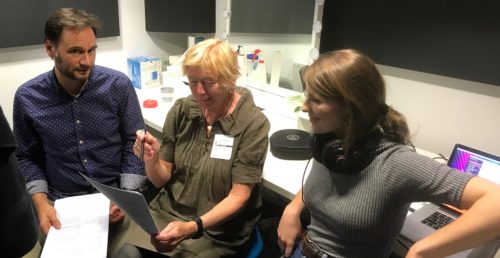
Greg Muller, Executive Producer, Siobhan McHugh, Consulting Producer and Rachael Dexter, Producer, at a script editing session for the "Wrong Skin" podcast, Melbourne, 4 May 2018.
I co-produced Phoebe’s Fall, my role being to advise on script, structure and craft, and to help the print journalist hosts transition to this new medium. I evangelized to them the strengths and weaknesses of audio storytelling: for instance the crucial importance, in a medium that only exists in real time, of space and pace. Unlike video, you can’t freeze-frame audio.
Now Baker wanted to apply his new knowledge to another, even more highly charged investigation: into the death of a young woman and the disappearance of her boyfriend in a remote part of Western Australia in 1994. The couple was Aboriginal and word was that they had incurred the wrath of traditional elders, because their relationship was “Wrong Skin:” They came from families forbidden to associate. Further, the young woman had been promised as a child bride to a much older man. Besides being about the collision of ancient culture and modern law, the story was about power, corruption and greed, involving mining royalties potentially worth billions. It unfolded in an isolated and sublimely beautiful landscape and involved voices of Aboriginal people rarely heard in Australian media. It had emotion, intrigue and no clear outcome — the perfect ingredients for a podcast, but not an easy one to make.
With newspapers from the New York Times (Caliphate, 1619) to the LA Times (Dirty John, Room 20 via LA Times Studios) seeking to harness podcasting as an outlet for narrative journalism, I sat down with Richard Baker to reflect on the learning process involved for a traditional print-first journalist moving into audio. Wrong Skin, he admits, was going to be a challenging undertaking in any medium:
Wrong Skin is a story about people and places unfamiliar to most of our audience. Whereas Phoebe’s Fall was easy to access – we had well educated and incredibly good-looking white people — Wrong Skin doesn’t have that immediate easy appeal. But I think it is a rich story that educates the audience. And that has been the best feedback. So many people have said they have learned so much they didn’t know about Indigenous history and culture through Wrong Skin.
Wrong Skin, which I also co-produced, was a year in the making. It dropped online as six episodes in July-August 2018, with an accompanying multimedia site. The production challenges were many. A mainstream audience would have difficulty understanding the uniquely Aboriginal way of speaking English (often a third or fourth language) in this remote community, yet we felt it was vital that these so often marginalized voices be literally heard. Thus we had to develop a way of scripting around the voices, sometimes included in fragmented form. The Kimberley region of Western Australia is the size of France but home to only 44,000 people. The physical distance from Melbourne (roughly 4,000 miles) and vastness and inaccessibility of the region (at times cut off by floods), meant we sometimes had to rely on phone interviews, done without tape synching and in areas of poor reception.
Cultural and political sensitivities were high. Some Aboriginal people (colloquially self-described as blackfellas) think non-Aboriginal people (whitefellas) should butt out of telling stories that concern Aboriginal people. Others believe that we live in a shared Australia now, and that it is ultimately to the common good that as many Australians as possible understand more about Aboriginal history and culture; at 60,000 years, it is considered the oldest continuous culture in the world. Our guiding principle was that Baker had been approached by Indigenous people to investigate the story and that there was a responsibility to take it on. We retained an Indigenous consultant to alert us to any cultural transgressions. We tweaked episodes in response to their suggestions. (Such were the delicacies, the consultant does not wish to be named.)
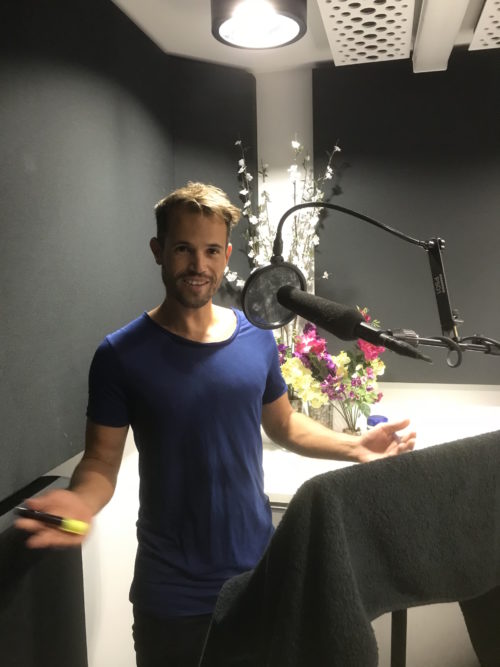
Australian journalist Richard Baker, host of the "Wrong Skin" podcast
The team was largely drawn from Phoebe’s Fall and followed a similar process. Baker developed an initial script as a Google doc, then the team worked on improving concision, clarity, and for me, especially, structure and craft: the layer of sounds, such as music and natural ambience, and careful placement of voice, to create powerful synergies. On Phoebe’s Fall, it had been a challenge to educate even very savvy journalists on their first foray into using sound, not text. I’d listen critically in real time to a draft episode and mark it up with what to them was double Dutch: “Let it breathe” was my constant mantra, meaning that the interview content needed “space” around it, an ambient or musical pause that allowed listeners to absorb what they had heard. This idea of timing as a crucial element in shaping the impact of the content seemed absurd to them at first. As Baker told co-producer Julie Posetti, “Space to me is a thing you hit on the keyboard.”
But by our second venture, he was starting to do as I implored: “Think through your ears.” By this I meant first getting the basics right, such as recording interviews with a closely positioned microphone and an absence of interfering background noise, such as traffic, café chatter or worst of all, the polluting rumble of wind. But I also alerted him to the myriad possibilities of sound itself: A distinctive bird call, the drumming of loud rain, the tinny cacophony of cicadas, the shouts and cheers at a sporting event — all can summon a world in the listener’s imagination.
It paid off. In Wrong Skin, the river becomes a physical presence: The loud splash as Wayne, our guide, seeks refuge in the water conveys the palpable heat, as does the panting of his dog. Learning to “think sound” was a major transformation for Baker. When he visited the grave of Julie Buck, the young Aboriginal woman whose body is found after she has run away with her forbidden lover, he was acutely conscious of the environment:I made sure to get the crinkle of my footsteps approaching and the sound of the wind and enormous solitude of her resting place before I even considered what I would say live into the recorder. There’s no way I would’ve thought of this on Phoebe’s Fall.
Baker’s scripting, too, slipped more easily into the idiom of audio. There were still occasional formalities to rectify and long, involved sentences to be reduced. He learned to describe where he was on the tape at the time and to paint in descriptions of whom he was talking to:
When you meet Joe for the first time, you soon learn he loves a laugh and is extremely fit for a man who’s just turned 70. He wears a big cowboy hat, like lots of men in these parts, and his long-sleeved blue shirt covers a barrel chest. His only concession to age is a haze across his big brown eyes.
Perhaps the biggest shift came when Baker — almost unconsciously — started including his own responses to what he was investigating.
On the matter of promised brides, I’m torn between thinking who am I to question cultural practices that have been going on in the Kimberley for thousands of years and wondering how any girl — my own 10-year-old daughter comes to mind — would feel about being promised out to a man two or three times her age?
Subjectivity is not just possible in podcasting – it is almost essential. Baker acknowledges that writing in the first person was previously anathema to him. “This goes back to formative training as a print journalist, where it was frowned upon for young journalists to have the temerity to believe anyone would be interested in what they think. Facts, facts, facts was the mantra and for the most part, it is good advice.” But storytelling via the affective power of audio is very different. This from Baker:
For the listener, you are a main character whether you think you are or not. They want to know what you think or feel about crucial elements of the story. I think if you as a host are unable to show that you also are affected by the real life drama then you risk alienating your audience and appearing inhuman.
We can feel Baker’s ceaseless curiosity, his desire to understand a completely different world view. We’re caught up in his quest, as he sets about asking uncomfortable questions and teasing out the difference between what is ‘cultural’ and what is right.
While in-depth interviewing is an important part of most feature journalism, in storytelling podcasts it becomes the crucial narrative spine. It’s vital not only to find the key people who can shed light on the story (the “talent”), but also to “secure” them — to build a strong relationship, that can evolve along with the story. Baker found he had to adapt his investigative approach to local geographical and cultural factors:It is a fact of life in the Kimberley, particularly as an outsider, that if you can’t relax and just go with the flow, you are only going to end up frustrated, exhausted and acting in a way that most people won’t want to talk to you, let alone trust you. So that’s what I did. I just let things happen and all of a sudden after a meeting with one person I’d end up being introduced to more and more people.
Baker’s working process also changed, from his previous document-oriented focus to an emphasis on people and voice. This made the writing phase less predictable: it had to be fluid:
You can’t afford to get concreted into a single-focus view of things. With print investigations that are document-based, you know the material you have to play with and its opportunities and limitations from the get-go.
All these elements helped to make Wrong Skin sound distinctive, a podcast whose multiple Indigenous perspectives opened up a very different Australia to the world. One man, an Indigenous lawyer criticized in the podcast for exploiting native title considerations for considerable financial gain, accused Baker of racism — something Baker considers “a badge of honor” that confirms that he exposed wrongdoing, as this was all the lawyer could find to criticize. The overwhelming response from Aboriginal Australians and elsewhere has strongly affirmed the podcast:
The feedback I’ve received from Indigenous people in the Kimberley and further abroad has been overwhelmingly positive. The women are pleased that somebody has cared enough to stick up for them and more than a few men have complimented me on having “the balls” to stand up to some pretty violent people.
Wrong Skin is a story that won’t let you leave it behind. So in a way I knew going into this that I’ve made myself a player in a bigger fight. In fact I had a man from the Western Desert in Western Australia ring me after the podcast to say that he and his other senior men were there to go to bat for me culturally and spiritually as they believed I’d come under attack in those senses from dark forces in the Kimberley. So as unnerving as that was to be told that, it was also reassuring. As the man said to me, “You’re in our world now.”
With Phoebe’s Fall, Baker largely kept his emotions subject to his analytical voice. In Wrong Skin, his investigation skills are just as much in evidence in the material he uncovers, but often his narration comes straight from the heart. It is powerful because, far from seeking to get us onside, he is striving to rein himself in:
Personally, I don’t warm to podcast hosts whose egos demand they constantly be injected into the story. I still believe in the “less is more” rule. I believe the use of subjective writing and scripting can have immense power and impact if used with discretion and care.
The result has been gratifying at many levels. The podcast scooped Australian Podcast of the Year and Best Investigative Podcast at the Australian Podcasting Awards in May and won gold in June 2019 at the New York Radio Festival, beating works from over 30 countries. But Baker is most pleased to have enthralled listeners about life and lore in this ancient part of Australia and informed and educated people about the Indigenous community: “To do that as well as entertain and push the police inquiry further than it ever expected to go has been a major achievement.” A sports enthusiast, Baker sums up what podcasting can do and the immense work it takes as “extreme feature writing.”
The team, this writer included, is deep at work on a new podcast, The Last Voyage of the Pong Su, a geopolitical thriller involving drugs, crime syndicates and a very different clash of cultures. Just released, it provides unparalleled insights into the workings of international police operations and toggles between two unlikely venues: a small town on Victoria’s shipwreck coast and a rustbucket cargo ship from North Korea. It introduces us to some unforgettable characters, including craft beer-averse, yuppie-hating fisherman and motormouth Dicky Davies, who gives the first episode its pithy title: This Fucking Boat. John B McLemore would no doubt approve.
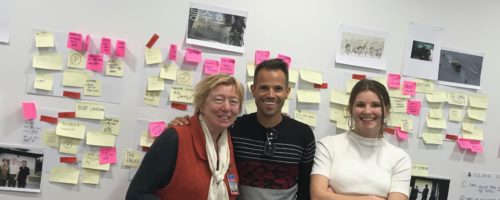
Host Richard Baker, executive producer Rachael Dexter (right) and Siobhan McHugh at a story conference this past July, showing the episode structure for their new podcast, "The Last Voyage of the Pong Su."


